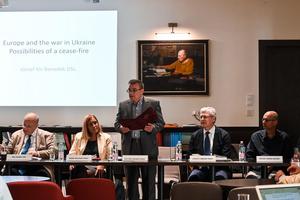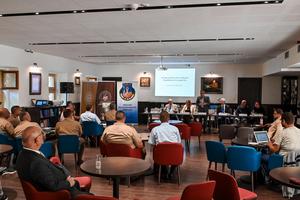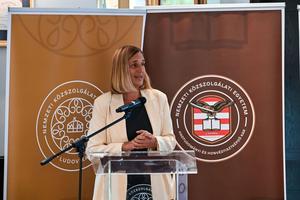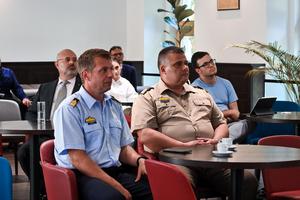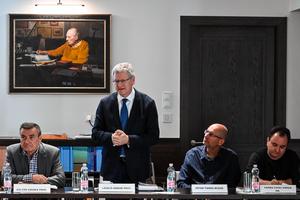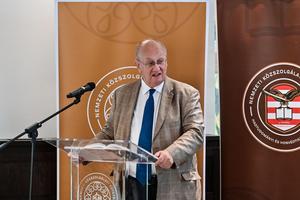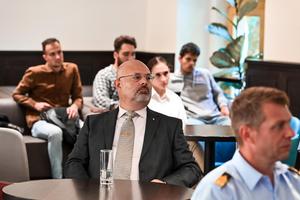The book "Europe and the War of Ukraine" was publicly presented on September 25th in the John Lukacs Lounge of the Ludovika Wing of Ludovika University of Public Service (LUPS). The event was organised by the Department of International Security Studies (DISS) of the Faculty of Military Sciences and Officer Training at Ludovika, the Hungarian Association of Military Sciences (HAMS), and the Foundation for European Progressive Studies (FPES) based in Brussels.
The event was opened by Zoltán Szenes, professor emeritus of LUPS, who stated that the newly published book, which appeared over the summer, consists of 22 chapters authored by 25 writers. In his welcoming speech, Anna Molnár, associate professor and head of DISS, added that it is important that a book that comprehensively covers the chosen topic has been published. Given the serious challenges to European security architecture, analysts and researchers now have the important task of helping to understand the events and their deeper connections.
The book was presented to the audience by Andor László and Péter Tamás Bozsó, economists, and Pál Dunay, associate professor at the Faculty of Social Sciences at Eötvös Loránd University (ELTE). Andor László, the editor of the volume, began his presentation by stating that Ludovika is undoubtedly the most suitable place for the presentation of such a book. Although it is about the war, it includes experts from a wide range of fields to help understand this very complex issue. He added that one of the conclusions of the study could be that the EU needs a new Eastern policy, as the war has invalidated the previous one. According to him, the most likely outcome is the emergence of a broader sense of reconstruction today, which affects not only Ukraine but the entire Eastern region. Andor László concluded that it would be gratifying if the book could be used in education as soon as possible, but it would be even better if we could already write about the end of the war.
Pál Dunay made remarks as an invited reviewer of the book. As he explained, it is important that the book has been published, and he will certainly use it in his own classes. However, he believes that including many chapters and more than twenty authors has made the book too complex, which has resulted in some topics being underdeveloped.
Péter Tamás Bozsó, the author of the chapter on energy policy in the book, spoke at the event. He talked about how, in the past, gas could only be transported between countries through pipelines. However, the emergence of new technology, liquefied natural gas (LNG), has brought significant changes to the market, as it can now be transported by tanker ships, even across the ocean. As a result, the USA has become a larger gas exporter than Qatar.
During the book presentation, expert comments were also provided by Anna Molnár, József Kis-Benedek, a retired colonel and honorary professor of LUPS, and Tamás Csiki-Varga, a senior research fellow at the Institute for Strategic and Defence Studies of the LUPS Eötvös József Research Center.
Anna Molnár emphasised that the book is closely related to the international project of her department, the EUSecure program. She highlighted that the issue of strategic autonomy received significant attention both in the book and the project. The war has revived European thinking about this, as evidenced by President Macron's statements, among others.
József Kis-Benedek provided a military and operational perspective on the topics covered in the book. As he explained, neither the Russians nor the Ukrainians have achieved their goals yet, and they are not capable of reversing the course of the war, so armed conflict could continue for years, whether at its current high intensity or at a lower level.
Tamás Csiki-Varga commented on the chapter in the book about German security policy. The war has had a significant impact on German domestic politics. While German decision-makers have realised that a new Iron Curtain could rise at the eastern border of NATO, the country is not yet prepared to be a defining player in world geopolitics.
You can read more about the book presentation on the university's scientific platform, ludovika.hu.
Text: Tibor Sarnyai
Photo: Dénes Szilágyi
